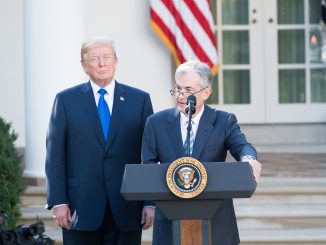The Federal Reserve Bank of New York sits in the heart of Manhattan’s financial district, a block from Wall Street, at the crossroads of global capitalism.
You’d think the bank’s staff might show at least a passing familiarity with how capital markets are supposed to work. But you would be hard pressed to detect such familiarity in their latest proposal for the improvement of money market funds. The staff’s recommendations, like others coming out of the current administration and its appointees, would literally improve money market funds to death, by making them useless.
Bloomberg recently reported on the staff’s big idea, which is to prohibit investors from withdrawing their money from such funds all at once. Instead, funds would be required to establish a “minimum balance at risk” that investors would only be able to withdraw after a 30-day notice period.
The staff’s report, released last Thursday, argues that the minimum balance at risk would serve as a deterrent to runs on money market funds by ensuring “a fairer allocation of losses among investors” should a fund break the buck (that is, allow its value to fall below $1 per share). The minimum balance at risk feature is already included in the proposal before the Securities and Exchange Commission that would injure money market funds in other ways as well, as I have discussed previously in this space.
Investors put their money in liquid investments, like money funds and bank checking accounts, because they want immediate access to their money – all of it. In normal times, the trade-off is a lower yield in exchange for that liquidity. But the Fed has eliminated most of that penalty by pushing virtually all interest rates as close to zero as possible, so that, to an investor, the liquidity of a demand deposit comes at very little cost compared to a three-month CD, for example.
Money funds provide a big benefit to the economy. Unlike banks, which these days are content to deposit vast stores of cash with the Fed itself, a money market fund is under great financial pressure to keep all its investments working. So the money funds are an efficient and constant source of ready cash to industrial companies and financial institutions all over the world. Companies can go to money market funds, issue paper and raise capital practically overnight – sometimes hundreds of millions of dollars, if need be. Just try getting a bank-processed loan in less than a month, even for a fraction of that amount.
But the Federal Reserve Bank is, after all, a central bank, and it likes to govern the economy through its control of the banking system. Money market funds operate largely outside that system. It appears that, from the staff’s perspective, bringing the funds to heel isn’t necessarily a bad thing, even if it takes credit away from the same businesses that the Fed is desperate to finance. This sounds self-defeating – because it is.
The staff argues that somehow, allocating any potential losses among a money fund’s shareholders should be “fair,” and that fairness is achieved by preventing the more fleet-footed investors from withdrawing their money before things get really ugly. (This despite the fact that in four decades of operation, money funds have almost never produced any losses at all, and those losses that occurred were just a few cents for every dollar invested.)
Let’s consider the argument that investment losses should be distributed in a manner that is “fair.” If you want to sell your S&P index fund, should the fund automatically hold back some of your money, just in case the stock market declines in the next 30 days? This would force you to share the losses that otherwise would fall to your fellow investors who opted to hold their shares instead.
How about if you sell your house? Should the escrow agent hold back some of your money until the buyer eventually sells the house, in case the house’s value should decrease in the meantime?
A system in which each investor accepts a personal risk of loss, in anticipation of an opportunity for gain, is called capitalism. The staff at the Federal Reserve Bank of New York might want to read up about it.




Leave a Reply